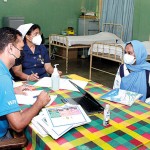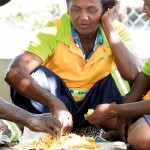News
Ensuring we leave no one behind
View(s):Today is World Food Day and the day assumes added significance to Sri Lanka this year as it faces an acute food crisis. The World Food Programme has said that 6.3 million people, or over 30 percent of Sri Lanka’s population, are “food insecure” and require humanitarian assistance, while the United Nations has issued an international appeal to help Sri Lanka overcome the food crisis. By the end of September, the UN’s US$ 47.2 million joint Humanitarian Plan for Sri Lanka had reached more than one million people out of a total target of 1.7 million highly vulnerable people with assistance covering food security, agriculture, nutrition, water, protection, and health.
This op-ed article by three experts representing the UN food agencies is published in view of World Food Day.
By Vimlendra Sharan, Sherina Tabassum and Abdur Rahim Siddiqui
Sri Lanka’s struggles are not unique. A global food crisis is unfolding as inflation spirals and conflicts escalate. More and more people are being left behind – the latest State of Food Security and Nutrition in the World (SOFI) Report found that 828 million people faced chronic undernourishment in 2021, 46 million more than in 2020. Dramatic inflation in essentials like food, energy, fertiliser and feed is pushing the cost of food beyond the reach of millions, hindering efforts to overcome present challenges and strengthen food security across the world.
In Sri Lanka, according to the joint FAO-WFP Crop and Food Security Assessment (CFSAM), two consecutive poor harvests have led to agriculture production declining by half. This, coupled with the foreign exchange constraints that have led to a reduction in food imports, has left about 6.3 million people in the country facing moderate to severe acute food insecurity. Women and children are among those most affected.
We know from the report who is being left behind. Now, we must act.
The task ahead is daunting – but it is not insurmountable. The CFSAM recommendations to provide immediate food or cash assistance to vulnerable communities, as well as agricultural inputs (including fertilisers) for smallholder farmers, are already being rolled out in the country’s worst-affected districts. At the same time, the United Nations (UN) is working collectively to mitigate the impact of the current crisis through a global appeal for support. The UN’s food agencies — FAO (Food and Agriculture Organisation), IFAD (International Fund for Agricultural Development) and WFP (World Food Programme) — remain committed to strengthening food security for all Sri Lankans, while supporting the government as it works to transform its agriculture, livestock and fisheries sectors to be more resilient, inclusive and sustainable, capable of withstanding future crises and ensuring easy and secure access to nutritious food for all.
This can only be achieved by taking bold measures to address the underlying and systemic problems within the agrifood system. Though agriculture is a critical part of Sri Lanka’s economy – eight out of 10 Sri Lankans live in semi-urban and rural areas, and at least a third depend directly or indirectly on agriculture for their livelihoods – as the current crisis proves, it has not received the depth of attention it needs. Sri Lanka must renew its focus on the people, who grow its food, especially women and young farmers, and modernise its agriculture sector with increased investment in research and innovation.
- About 6.3 million Sri Lankans face moderate to severe food insecurity. Below: A WFP official is seen collecting data for a UN food programme. Pix by Indika Handuwala
Farmers, especially small-scale producers and rural businesses, must be empowered with the funds, skills, tools and training to transform the way they grow our food. This means investing in greener technologies and methods to produce food, so that Sri Lanka’s land remains fertile for our children and grandchildren. It also means building better roads, better storage facilities, and better services in rural areas. And it means ensuring that markets fairly reward farmers for their work. The new Agriculture Policy introduced by the Ministry of Agriculture is a promising step in this direction, and we stand ready to support the government in
building resilience into its food and agriculture sectors.
While Sri Lanka works to break its cycle of poverty and hunger, we also recognise that no nation can stand alone in this most urgent of tasks. Governments must avoid ad-hoc reactionary measures that threaten the production capacity and food security of more vulnerable nations. The way out of the present crisis – and the way to a more sustainable and resilient future – requires time, effort and long-term investment by donor countries, developing nations and development partners alike, including the private sector. If we work collectively to ensure better production, better nutrition and a better environment, we will succeed in building a better life for all in Sri Lanka, leaving no one behind.
(Vimlendra Sharan is FAO Representative in Sri Lanka and the Maldives, Sherina Tabassum is IFAD Country Director Sri Lanka and the Maldives, and Abdur Rahim Siddiqui is WFP Representative and Country Director in Sri Lanka).
The best way to say that you found the home of your dreams is by finding it on Hitad.lk. We have listings for apartments for sale or rent in Sri Lanka, no matter what locale you're looking for! Whether you live in Colombo, Galle, Kandy, Matara, Jaffna and more - we've got them all!



